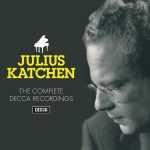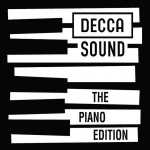
Composer: Ludwig van Beethoven, Johannes Brahms, Frédéric François Chopin, Ferencz Liszt, Robert Schumann
Performer: Julius Katchen
Format: FLAC (tracks)
Label: Audite
Catalogue: AUDITE21419
Release: 2014
Size: 310 MB
Recovery: +3%
Scan: yes
01. Liszt: Piano Sonata in B Minor, S. 178 / R. 21
Brahms: Fantasies (7 piano pieces), Op. 116
02. No. 1, Capriccio in D Minor
03. No. 2, Intermezzo in A Minor
04. No. 3, Capriccio in G Minor
05. No. 4, Intermezzo in E Major
06. No. 5, Intermezzo in E Minor
07. No. 6, Intermezzo in E Major
08. No. 7, Capriccio in D Minor
Brahms: Klavierstücke, Op. 118
09. No. 2, Intermezzo in A Major
10. No. 5, Romanze in F Major
11. Brahms: Scherzo in E flat minor, Op. 4
12. Beethoven: Variations on an Original Theme in C minor, WoO 80
13. Beethoven: Rondo a capriccio in G major, Op. 129 ‘Rage over a lost penny’
14. Schumann: Waldszenen, Op. 82: No. 7, Vogel als Prophet (the Songster-Prophet)
15. Chopin: Nocturne No. 2 in E-Flat Major, Op. 9, No. 2
16. Chopin: Ballade No. 3 in A flat major, Op. 47
17. Chopin: Nocturne No. 8 in D-Flat Major, Op. 27, No. 2
18. Chopin: Berceuse in D flat major, Op. 57
This anthology of Julius Katchen’s complete solo recordings made during two recording blocks in 1962 and 1964, expands Katchen’s discography by as many as six first releases: Beethoven’s Rondo Op. 129, Rage Over a Lost Penny, Chopin’s A flat major Ballade, the two famous Nocturnes Op. 9.1 and Op. 27.2, the late Berceuse, and finally Liszt’s Piano Sonata in B minor, one of the pillars of 19th century piano music. Katchen’s energetic and virtuosic reading of the Liszt sonata ranks highly amongst the great recordings of this piece. However, his interpretations of the works by Chopin, Beethoven and the late Brahms, thanks to his natural combination of virtuosity, musicianship and sense of form, are also documents of magnificently timeless piano-playing.
Julius Katchen (1926-1969), who died tragically early of leukaemia, represented, alongside Leon Fleisher, Gary Graffman and William Kapell, the generation of the so-called OYAPs (Outstanding Young American Pianists) who from 1940 onwards established themselves as strong and enduring competition to the European pianists who had dominated American concert stages until that point. Katchen had been born into a Russian-Jewish family of immigrants in the state of New Jersey and made his début aged only 10 with Mozart’s D minor Concerto. In the following year he was invited by Eugene Ormandy to take part in a concert with the Philadelphia Orchestra as the youngest ever soloist in the history of that orchestra. A year after that he gave his solo début in New York. In 1946 Katchen moved to Paris, becoming one of the most active American musical ambassadors in Europe. His extensive discography, at whose centre are the complete piano works of Brahms, shows him to be a sophisticated virtuoso of the new type, for whom pianistic brilliance was no raison d’être as such, but instead served a deep intellectual and emotional penetration of the music.



